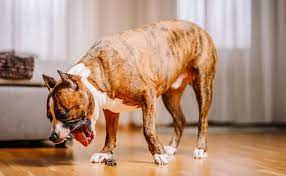Sometimes, when a dog throws up yellow foam or bile, it could mean they’re just hungry. When their stomach is empty, the acids in the stomach can irritate it, making them feel sick. But yellow vomit might also signal an illness or something they ate, so don’t ignore it as just hunger.
If your dog throws up once and seems okay otherwise, usually, it’s not a big concern. But if they show other signs of being sick, it’s best to call your vet. Here are some common reasons why My Dog Is Throwing Up Clear Liquid, bile, or liquid.
A dog vomiting yellow foam or bile may simply be experiencing hunger; when the stomach is empty, gastric acids can irritate the stomach lining, leading to nausea. However, yellow vomit may also indicate an illness or ingestion of something harmful, so it’s important not to dismiss it as merely a sign of hunger.
If a dog vomits once and otherwise appears healthy, it’s typically not a cause for concern. However, if other signs of illness are present, it’s advisable to contact a veterinarian. Below are some common reasons Why Is My Dog Is Throwing Up Clear Liquid?, bile, or liquid.
Why Do Dogs Vomit Yellow Bile?
Dogs may vomit yellow bile for various reasons. Sometimes, it’s because their stomach is empty, and the acids and bile produced for digestion irritate the stomach lining. This can happen when a dog hasn’t eaten for a while, leading to the expulsion of the yellowish fluid.
Dogs may throw up yellow bile because their stomachs are empty. This can happen when they haven’t eaten for a while, and the acids and bile in their stomachs irritate the stomach lining. But sometimes, it can also mean the dog has an illness. Yellow vomit usually has stomach acids and bile, which are fluids that help with digestion.
When there’s no food in the stomach to balance these fluids, it can make the dog feel sick and vomit. If your dog throws up yellow bile once in a while and seems okay otherwise, it might not be a big problem. But if it happens a lot or if your dog seems sick, it’s best to see a vet.
There are other reasons why a dog might vomit yellow bile, like if they ate something they couldn’t digest or if they have a health problem like bilious vomiting syndrome or liver disease. If your dog keeps vomiting, especially if it’s happening often, it’s important to get them checked by a vet.”
Reflux gastritis:
Bilious Vomiting Syndrome, also called reflux gastritis, is a common reason why dogs vomit, especially as they get older. Dogs with this issue often throw up yellow bile in the morning before they eat breakfast, but then they act normal afterward.
It happens because the bile irritates their stomach. You can stop it by giving your dog a small meal before bedtime and feeding them breakfast right away in the morning so their stomach isn’t empty for too long. If this doesn’t work, your vet might give you medicine called an antacid to help.
Indigestion
Dogs have a habit of eating stuff they shouldn’t, like spoiled food from the trash, grass, or things they find on the ground. Sometimes, if they eat something bad, they might throw up. You might notice foamy yellow vomit. Usually, this isn’t a big deal, especially if it’s a one-time thing. But if your dog keeps eating things they shouldn’t, it could lead to more vomiting.
Pancreatitis
Pancreatitis is when the pancreas, which helps with digestion, gets inflamed. It often happens after a dog eats a meal that’s really fatty. If your dog has pancreatitis, they might vomit yellow bile, have diarrhea, and seem to be in a lot of pain. It’s important to take them to the vet for help and treatment.
Intestinal Blockage
Dogs can develop an intestinal blockage if they swallow something they shouldn’t, like a toy, bone, or piece of cloth. At first, they might throw up food, but if their stomach is empty, they might vomit yellow bile.
Your dog might also seem painful, weak, or tired, refuse to eat, and struggle to poop. Treating intestinal blockages often involves surgery, although sometimes a vet can use an endoscope inserted through the throat to remove the blockage from the stomach.
Toxin Exposure
At times, a dog might vomit yellow bile after ingesting something harmful like chocolate, medications, or toxic plants. Along with this, they may experience shivering, weakness, diarrhea, loss of appetite, or stomach pain. If your dog displays these signs, especially if you think they consumed something toxic, it’s crucial to contact your vet right away.
Systemic Illness
Dogs with systemic illnesses like kidney disease, liver disease, Addison’s disease, or other chronic conditions may vomit yellow liquid due to digestive issues or nausea caused by their condition. Your vet can provide guidance on managing these health conditions effectively.
Why Is My Dog Is Throwing Up Clear Liquid?
If your dog throws up yellow foam or liquid just once, don’t worry too much. But here are some things you can do:
- Keep an eye on your dog for signs of being tired, having diarrhea, not wanting to eat, feeling weak, or any other signs of being sick.
- If your dog seems okay otherwise, go ahead and give them their next meal when it’s time, and see if they vomit again.
- If the vomiting keeps happening, don’t give your dog their next meal and keep watching them.
- After skipping one meal, offer the next meal as usual and keep an eye out for more vomiting or other signs of sickness.
- If your dog keeps throwing up or shows other symptoms, it’s a good idea to call your vet for advice.
- Make sure your dog has access to water to stay hydrated, especially if they’re vomiting.
- Keep track of any potential triggers or changes in your dog’s environment or diet that could be causing the vomiting.
- Consider keeping a journal of your dog’s vomiting episodes, including the time, frequency, and any accompanying symptoms, to provide useful information for your veterinarian.
Treatment for Vomiting in Dogs
Your veterinarian will begin by conducting a thorough examination of your dog, taking into account their medical history, including current medications and diet. It’s essential to provide any information about potential ingestion of plants, chemicals, or hazardous foods.
Diagnostic tests may be recommended by your vet to identify the underlying cause of the vomiting. These tests often include blood and urine analysis, X-rays, and possibly ultrasounds.
In the case of suspected bilious vomiting syndrome, your vet might suggest feeding your dog a small meal before bedtime and ensuring they have breakfast right away in the morning.
For persistent vomiting, treatment typically involves administering anti-nausea medications, antacids, or gastrointestinal (GI)-protectant drugs. Initial doses may be given via injection to prevent further vomiting.
Dehydration is a common consequence of continuous vomiting, so fluid therapy, such as subcutaneous or intravenous fluids, may be advised depending on the level of dehydration.
In severe cases of dehydration or if conditions like pancreatitis, systemic illness, or infectious diseases are suspected, hospitalization may be necessary. During hospitalization, dogs receive intravenous fluids and regular medication while being closely monitored.
If poisoning is the cause of the vomiting, your vet will follow specific treatments for the toxin involved, often requiring hospitalization.
If a gastrointestinal obstruction is suspected, surgery or endoscopy may be necessary to explore the GI tract and remove the obstruction. Post-operative care in a hospital setting will be essential for recovery.
How to Prevent Vomiting in Dogs?
To prevent vomiting in your dog, it’s crucial to keep them away from things they shouldn’t eat, lick, or chew. However, sometimes vomiting can occur without a clear cause due to various illnesses.
Why Is My Dog Is Throwing Up Clear Liquid?
- Schedule regular wellness check-ups with your vet, at least once a year, or more often if your vet recommends it.
- Provide a balanced diet and limit treats to maintain your dog’s health.
- Keep harmful substances like plants, chemicals, human food, and other toxins out of your dog’s reach.
- Supervise your dog while they play with chew toys, especially if they tend to destroy them.
- Prevent your dog from licking, chewing, or consuming dangerous items.
Remember to contact your vet at the first signs of illness, as delaying treatment can worsen the situation. If you’re unsure, it’s best to visit the nearest open vet office for assistance.



